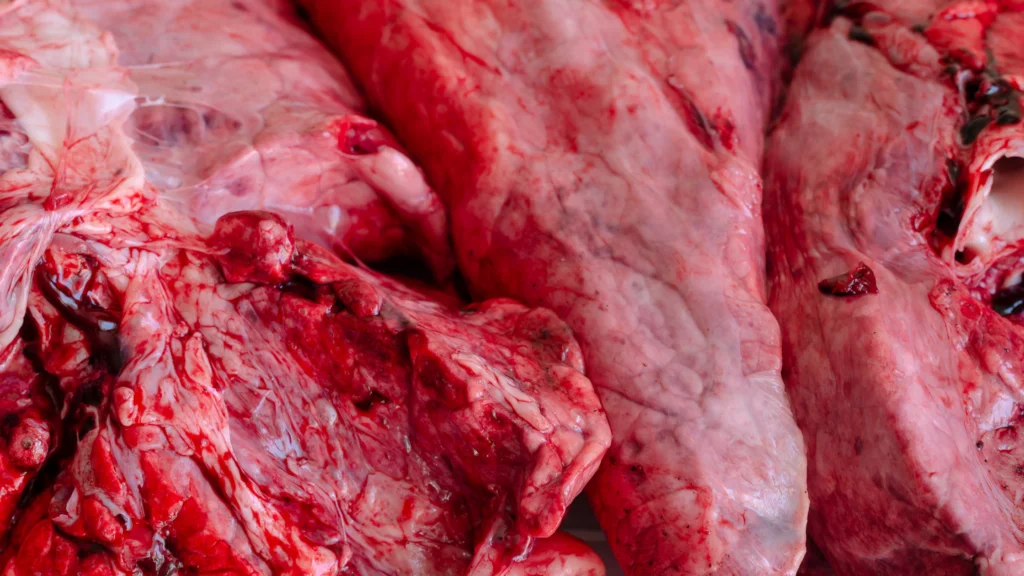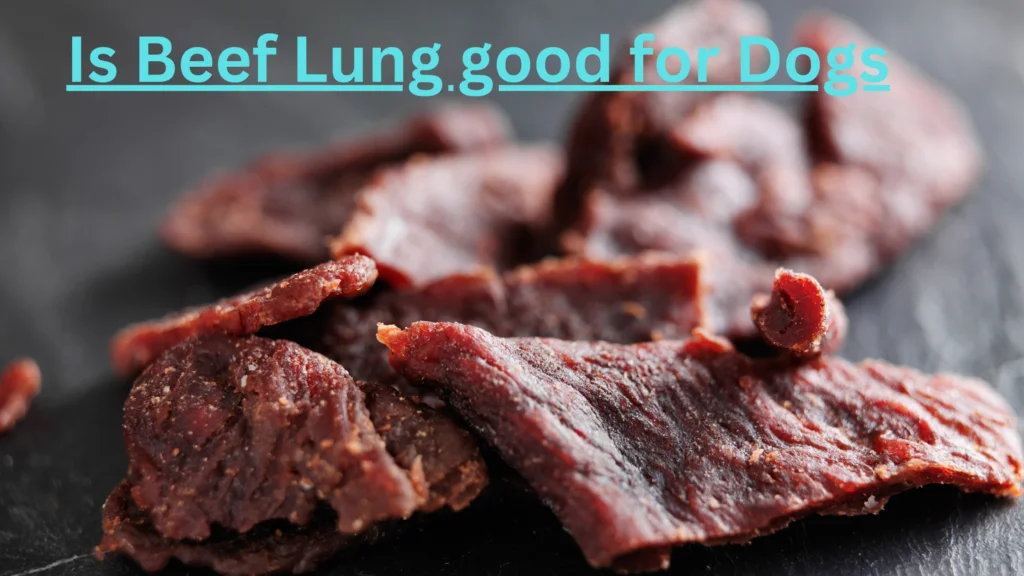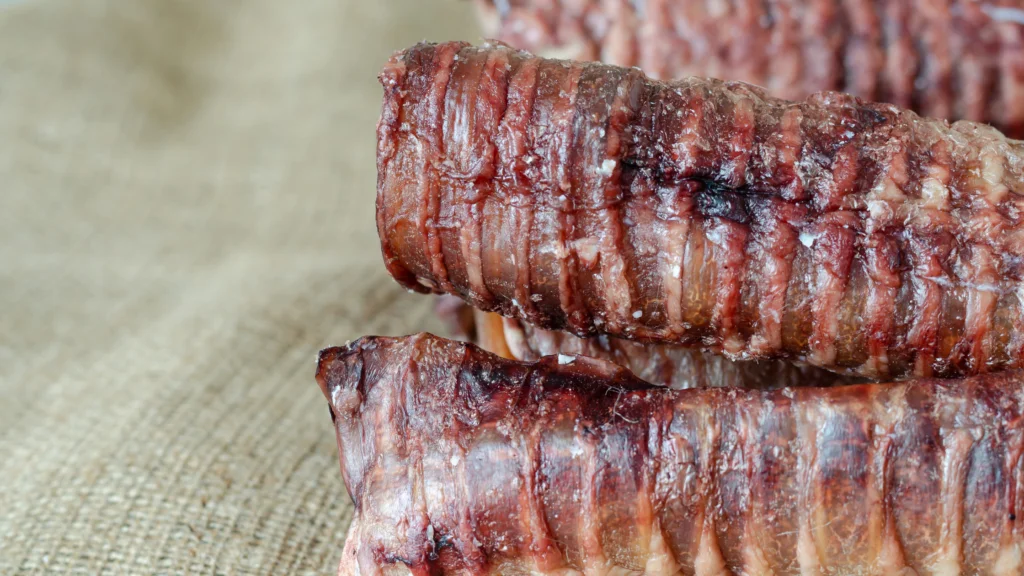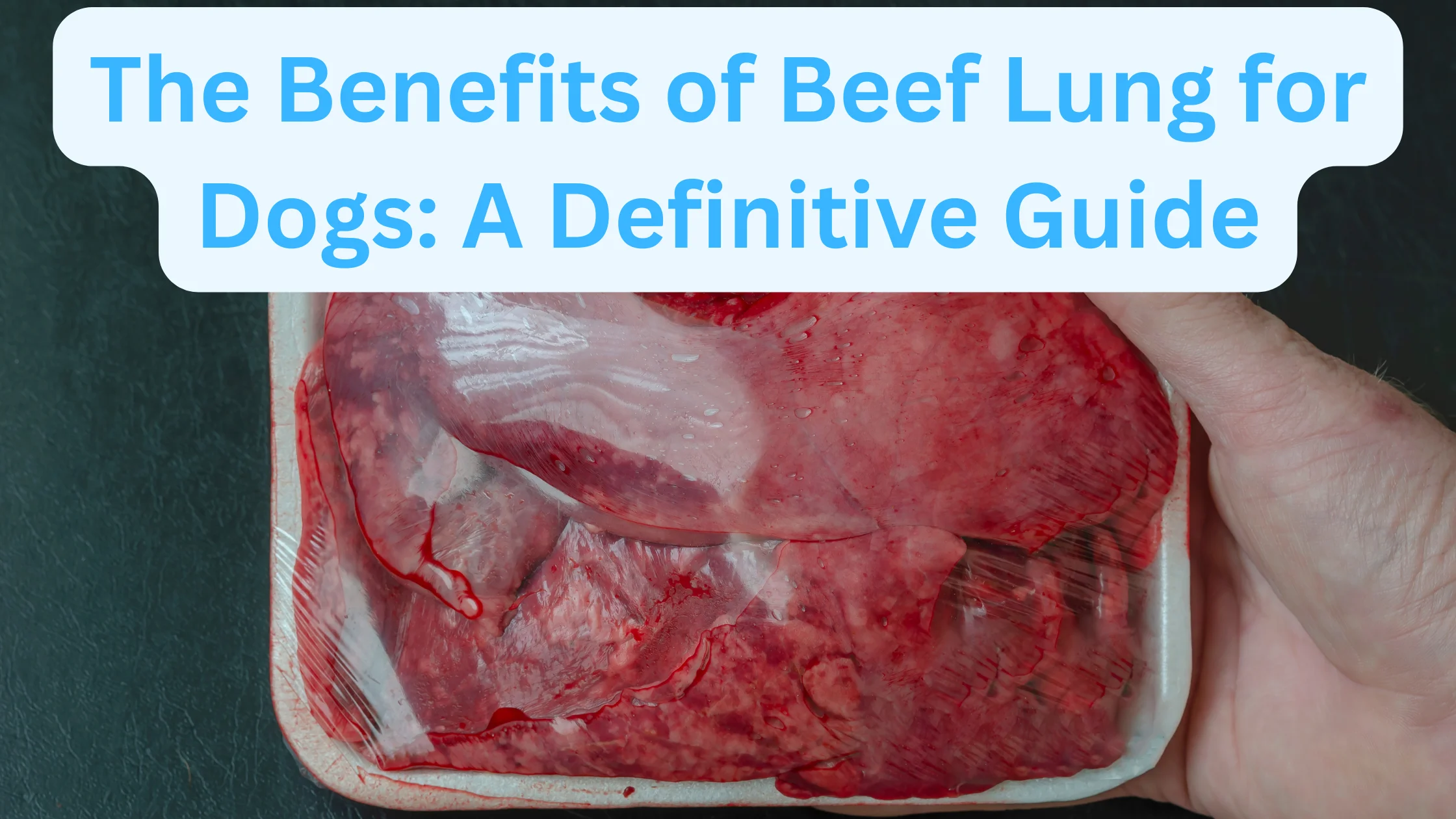You may be wondering if beef lung is a good source of protein for your pup. Well, wonder no more! In this article, we’ll discuss the benefits of beef lung for dogs and provide you with a definitive guide on how to add it to their diet.
What Is Beef Lung?

Beef lung is a beef organ that is high in protein and low in fat. It is also a good source of minerals, including selenium, zinc and iron. Beef lung is an excellent source of chondroitin sulfate and glucosamine, which are beneficial for joint health.
Many people are surprised to learn that beef lung is a nutritious food for dogs. It is a controversial ingredient among pet parents, but there are many benefits to feeding beef lung to dogs.
Nutritional Value of Beef Lung
| Nutrition value of beef lung | |
|---|---|
| Serving Size 100 grams | |
| Amount Per Serving | |
| Calories 120 Calories from Fat 33 | |
| Daily value % | |
| Total Fat 3.7g | 6% |
| Saturated Fat 1.3g | 6% |
| Trans Fat 0g | |
| Cholesterol 277mg | 92% |
| Sodium 101mg | 4% |
| Potassium 173mg | 5% |
| Total Carbohydrate 0g | 0% |
| Dietary Fiber 0g | 0% |
| Sugars 0g | |
| Protein 20.4g | 41% |
| Vitamin A 1% • Vitamin C 55% Calcium 1% • Iron 30% Thiamin 2% • Riboflavin 8% Vitamin B6 1% • Vitamin B12 43% Niacin 12% • Magnesium 3% Phosphorus 18% • Zinc 11% Copper 11% • Pantothenic Acid 6% | |
| * Percent Daily Values are based on a 2,000 calorie diet. Your daily values may be higher or lower depending on your calorie needs. |
Beef lung is a powerhouse of nutrients for dogs. It’s high in protein and essential vitamins and minerals, including zinc, selenium, iron and copper. This makes beef lung a great addition to your dog’s diet for boosting their overall health and vitality.
What’s more, beef lung is also a good source of omega-3 fatty acids. These fatty acids are beneficial for maintaining healthy skin and coat, reducing inflammation, and supporting cognitive development and joint health. So if you’re looking for a way to give your dog a nutritional boost, beef lung is definitely worth considering.
Is beef lung good for dogs? Can dogs eat Beef Lung?

Are you considering adding some beef lung to your pup’s diet? Well, you’re in luck! Beef lung can be a great addition to your pup’s diet, as it’s a high-quality protein source that’s packed with essential nutrients.
But, as with any new food, there are some things to consider before adding beef lung to your pup’s diet. First, you’ll want to make sure that your pup is not allergic to beef or any other type of meat.
Additionally, because beef lung is a highly processed meat product, it’s important to make sure that it’s sourced from a reliable source.
And finally, as with any food, it’s important to feed your pup the appropriate portion size to avoid digestive upset.
Overall, beef lung can be a great addition to your pup’s diet, but it’s important to make sure that you do your research and make sure that it’s sourced from a reliable source.
With the right approach and proper portion size, beef lung can be a great source of protein and essential nutrients for your pup.
Also Read: what are the nutritional requirements for a dog
The Benefits of Beef Lung for Dogs
Beef lung has been used for centuries in traditional Chinese medicine. It was believed to have medicinal properties and could be prescribed for various conditions. Today, beef lung remains popular among pet owners. Here are the benefits of beef lung for dogs. Beef lung has been used for centuries in traditional Chinese medicine. It was believed to have medicinal properties and could be prescribed for various conditions. Today, beef lung remains popular among pet owners. Here are the benefits of beef lung for dogs.
#1. Improves Digestion
Beef lung helps improve digestion in dogs. This supplement improves the flow of digestive juices in the stomach and intestines. As such, it prevents food from stagnating in these areas and aids in the absorption of nutrients.
#2. Boosts Immunity
Beef lung boosts immunity in dogs. It works by increasing the immune system’s ability to fight infections. It does this by stimulating white blood cells, antibodies, and phagocytes.
#3. Promotes Healthy Skin
Beef lung promotes healthy skin in dogs. It helps maintain healthy skin and hair by improving circulation in the area.
#4. Helps Maintain Normal Blood Pressure
Beef lung keeps normal blood pressure in dogs. It helps prevent hypertension, an abnormally increased level of blood pressure. Hypertension causes damage to the kidneys and eyes.
#5. Relieves Pain
Beef lung relieves pain in dogs. It reduces inflammation in joints and muscles and helps relax tense muscles.
#6. Increases Appetite
Beef lung increases appetite in dogs. It stimulates the appetite centers in the brain and increases the desire to eat.
#7. Prevents Hair Loss
Beef lung prevents hair loss in dogs. It protects against hair loss caused by stress, illness, aging, hormonal changes, and nutritional deficiencies.
#8. Treats Urinary Tract Infections
Beef lung treats urinary tract infections in dogs. It fights bacteria that cause UTIs and helps eliminate toxins associated with UTIs.
#9. Reduces Stress
Beef lung reduces stress in dogs. It calms nervousness and anxiety and provides relief from insomnia.
#10. Eases Constipation
Beef lung eases constipation in dogs. It maintains proper bowel habits and functions well as a laxative.
#11. Strengthens Bones
Beef lung strengthens bones in dogs. It supports bone growth and repair and helps strengthen weak bones.
Different Types of Beef Lung Dogs Treats
Just as with people, not all beef lung is created equal. There are a few different types of Beef Lung Dog Treats you can give your dog, and each has its own unique set of benefits.
- Raw beef lung – is the most natural and healthy option. It’s high in protein and low in fat, making it a great choice for dogs who need to gain weight or build muscle. It also contains important vitamins and minerals like zinc, selenium and iron.
- Cooked beef lung – is a good choice for dogs with sensitive stomachs. It’s lower in protein and fat than raw lung, but still contains all the nutrients your dog needs for a healthy diet.
- Beef lung jerky – is a convenient (and tasty) way to give your dog the benefits of beef lung. It’s high in protein and low in fat, and it’s also soft enough for dogs who are picky eaters or have difficulty chewing.
How to Add Beef Lung to Your Dog’s Diet
Adding beef lung to your dog’s diet can be as simple as adding some ground beef to his or her kibble. However, if you want to make sure that your dog gets all the benefits from beef lung, then you should consider supplementing with beef lung powder.
There are several brands of beef lung supplements available online. Some of these products include beef liver and heart, while others contain just beef lung. The best option will depend upon what your dog needs most at any given time.
If you choose to use beef lung powder instead of supplements, you’ll need to mix them into your dog’s food. You can find beef lung powder in both dry and wet form. If you choose to use the powder, you’ll want to follow the directions carefully when mixing it into your dog’s food so that they get the proper amount of nutrition.
Considerations When Feeding Beef Lung
When choosing between beef lung supplements and beef lung powder, you should look for a product that contains only beef lung. You don’t want to risk introducing other ingredients into your dog’s diet.
If you decide to feed your dog beef lung, make sure that he has access to fresh water at all times. As with any raw meat, beef lung can carry bacteria that could cause illness.
Beef lung is not recommended for puppies less than six months old. Although it is still safe to feed beef lung to older pets, there are risks
How to Prepare Dehydrated Beef Lung for Dogs

If your pet loves beef lung, the next step is preparing it for them so they can enjoy it! The best way to do this is to dehydrate the beef lung. Dehydration helps preserve the vitamins and minerals while removing all the moisture, so you don’t need to worry about spoilage.
- The process itself is surprisingly simple.
- First, start by cutting the beef lung into small pieces or strips that are suitable for your pet’s size.
- Then, preheat your oven to 150 degrees Fahrenheit and spread your pieces out on a baking sheet.
- Place in the oven and let them dry for several hours or until they are completely dry and crispy.
- Once finished, take them out of the oven and let them cool before feeding to your pup.
- You can store any leftovers in an airtight container in a dark and cool place for up to two weeks or in the freezer for longer shelf-life.
Alternatives to Beef Lung
If you’re looking for alternative protein sources for your pup, there are plenty of other options. You can try feeding your pup fish, such as salmon or whitefish. Eggs are also a good source of protein and can be served cooked or raw.
Other alternatives to beef lung include chicken, turkey, and beef. These can be served cooked, raw, or as treats. If you’re looking for a plant-based protein source, you can try tofu or tempeh. You can also give your pup a variety of beans, such as kidney beans, chickpeas, and black beans.
Frequently Asked Questions
Can dogs eat raw beef lung?
– Yes, they can. However, it’s best if you boil your dog’s food first to kill any bacteria that may be present.
What is the best meat to dehydrate for dogs?
– All meats are good choices for drying. However, some meats may require more time to get completely dried out than others. When you choose your meat, consider how long it will take to cook. If you want to avoid cooking times, look for cuts like beef brisket, pork loin chops, lamb shoulder chops, chicken thighs, turkey breasts, and ground chuck (beef). These cuts tend to dry quickly.
Is freeze dried beef lung good for dogs?
– Freeze dried beef lung is not recommended for dogs due to the risk of salmonella contamination. However, this product has been used successfully by veterinarians to treat respiratory infections in pets.
Is beef lungs a muscle meat?
– Beef lung is not considered a true muscle meat. It is more like a connective tissue (collagen) which is part of the body’s connective tissues.
can dogs eat raw beef trachea?
– Raw beef trachea should not be fed to your dog. The reason is that it contains bacteria which may cause illness, or even death, if ingested by your pet. Tracheas are removed from cattle during slaughtering.
Are beef Windpipes good for dogs?
– Beef Windpipes are not recommended for dogs due to the high levels of sodium they contain. These pouches may cause your dog’s kidneys to work harder, which could lead to kidney failure.
Conclusion
If you’re looking for a healthy, natural treat for your dog, beef lung is a great option. Beef lung is high in protein and low in fat, making it a nutritious treat for your dog. Beef lung is also rich in iron and other minerals, which can help keep your dog healthy and active.
Dehydrated beef lung is a great option for dogs who are sensitive to wheat or other grains. Be sure to check the ingredients list on the package to make sure the product is grain-free.
If you’re looking for a healthy, natural treat for your dog, beef lung is a great option. Beef lung is high in protein and low in fat, making it a nutritious treat for your dog. Beef lung is also rich in iron and other minerals, which can help keep your dog healthy and active.
